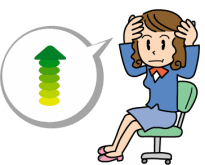いま、1型糖尿病は
2010年05月21日

On the other hand, there are some other patients who get so surprised to find low glucose measurement and just start eating a lot of sweets without thinking. They repeat this over and over. Though they know in their heads they do not need to panic, they end up eating too much at such times. These people are fearful of hypoglycemia.
In either case, if the level of their fear is not so high, it is no problem. However, some patients are paranoid, and it sometimes leads to trouble.
Phobia of hyperglycemia
These patients hate hyperglycemia so much that it makes me wonder where they got that idea. They hate it because it causes complications. They would say, "Doctor, the message posted on the wall of the hospital says that HbA1c should be 7.0% or below. Why could I ignore even a little hyperglycemia?" And some of them end up developing unconscious hypoglycemia repeatedly.
One of the reasons for such phobia is that there may be too much emphasis on teaching patients that diabetic complications are dreadful at their first hospital after diagnosed as diabetic. They may be obsessed with cleanliness in the first place. When they find high glucose measurement, they immediately inject additional insulin that is enough to cause hypoglycemia.
Curiously, they do not usually tell their doctors that they are often experiencing hypoglycemia. Therefore, the doctors often do no know that their patients have hypoglycemia frequently. Seeing those patients' HbA1c value being stable, the doctors may tell them to "keep it up".
Then, when such patients are brought to hospital by ambulance due to serious hypoglycemia, the doctors find out for the first time that the patients have often been developing hypoglycemia, and they lose face.
I have heard a scholar at an overseas symposium on CGMS saying that such hypoglycemia-phobia patients should avoid wearing CGMS (Continuous Glucose Monitoring System) device because it will make them even more obsessed with hyperglycemia. The same logic applies to frequent blood glucose testing. These patients measure their glucose frequently to get low measurement.
I encourage patients with this habit to try hard to reduce the frequency of testing. Trying hard is what is needed. I ask them to make efforts to "force back" their urge to test.
Reduce hypoglycemia
You probably know that if you have developed hypoglycemia repeatedly, you get used to being hypoglycemia which makes it difficult for hypoglycemic symptoms to show. That in itself is not a good thing, but I would rather want to have patients lead a laid-back life (inhaling and exhaling slowly as if deep breaching) and tell them to reduce the frequency of glucose testing as much as possible. At any rate, glucose testing is more painful than insulin injection.
Phobia of hypoglycemia
This is the opposite of hyperglycemia phobia. These patients become nervous when looking at low glucose measurement (value that seems low to them) and just cannot resist putting food in their mouth until they are free of nervousness. They know in their heart that they have to keep their blood glucose low, but once they see low measurement value, they cannot control themselves. In general, their HbA1c is not good.
Once again, one of the reasons for such phobia may be that they may have been told emphatically at their first hospital that hypoglycemia is something that should be feared. Or they may be paranoid or afraid of acting independently in their first place.
In the case of these patients, wearing CGMS is likely to lead them to a better direction since they can realize that "it is ok to have low glucose level". It does not have to be CGMS, and getting hospitalized for a short time to have their blood glucose decreased may also be a good idea because they can learn that they will have right hypoglycemic symptoms by artificially decreasing glucose value in a gentle pace.
No hypoglycemic symptoms?
Some patients say that they have a difficult time sensing hypoglycemia as they do not develop hypoglycemic symptoms and thus likely to cause asymptomatic hypoglycemia. However, when I press them a bit further, I often find that they do actually have hypoglycemia symptoms. They do not recognize symptoms experienced as hypoglycemia symptoms in many cases. It is not asymptomatic but they are simply not aware.
As I have written in one of the past articles, hypoglycemic symptoms are becoming more varied year by year and some symptoms may not seem like hypoglycemic symptoms. It is very important to observe how your body really feels.
This may be more important than measuring your own blood glucose level.
©2010 Yasuko Uchigata
高血糖恐怖症と低血糖恐怖症

その反対に、血糖値の低い数字をみるともうびっくりしてすぐ、後先を考えずに、何か甘いものをいっぱい食べてしまう方がいます。これを何度も繰りかえしてしまいます。
頭では慌てなくてもいいのだと思うのですが、その場になると、食べ過ぎるほどに食べてしまいます。このような方は低血糖恐怖症といえましょう。
どちらの方も、軽いのなら問題ないのですが、極端な方もいらっしゃって、問題が起こってくることがあります。
「先生、病院の壁に、HbA1c 7.0%以下にしなさいと書いてあるじゃないですか、どうしてすこしの高血糖を無視していいのですか」と言って、意識がなくなる低血糖症を何度もおこす方がいます。
糖尿病と診断されて最初に入院した病院で、ともかく糖尿病性合併症というのはこわいものだ、と教えすぎることも原因のひとつかもしれません。もともと、潔癖主義の性格があったのかもしれません。
高血糖値が出たら、低血糖をおこすほどにすぐインスリンを追加して注射してしまうのですね。
しかしフシギなことに、低血糖をちょくちょくおこしていることをあまり主治医に言わないことが多いのです。だから、主治医は、そんなに低血糖をおこしていることを知らないことが多いですね。HbA1c値がいいので、「こんな調子でいきましょう」となってしまいます。
そして、大きな低血糖をおこして病院に救急などで来院したときに、よく低血糖症をおこしていることがはじめて判明します。主治医、形無しです。
このような高血糖恐怖症の方には、CGMS(持続糖測定システム)の器械を装着することは避けるようにと、海外の学会でCGMSのシンポジウムで話していた学者がいました。高血糖にこだわりをもってしまうからだろうということでした。
血糖測定が頻回になりやすいことも同じリクツでしょう。頻回に測定してできるだけ低くしようとしてしまいます。
私は、このようなクセのある方には、できるだけ測定回数を減らすように、がんばってもらいます。がんばる気持ちが必要です。測定したい!という気持ちを「押し殺してもらう」努力をしていただきます。
低血糖症を何度もおこしていると低血糖状態に慣れてしまい、低血糖症状が出にくくなるといわれているのはご存知でしょう。
私は症状が出にくくなることもよろしくありませんが、もっともっとゆったりした生活(深呼吸でもしているような、楽に空気を吸ったり吐いたりする生活)をしていただきたいと思い、すこしでも血糖測定回数を減らしていただくように、お話しします。
それに血糖測定自体はインスリン注射に比べて痛いのですね。
頭の中では、血糖値は下げておかねばならないとは理解しているのですが、低い数字を見ると、だめなのです。一般的に、HbA1c値は良くありません。
はじめての入院中に、低血糖はこわいものだ、とこれも押し付けるように教わってきたことも原因かもしれません。
もともと何に対してもこわがりの性格なのかもしれません。自分ひとりで行動することがこわいという性格なのかもしれません。
この場合は、CGMSをつけることで良い方向に働く可能性が大きいです。「そうか低くなっても大丈夫なのだ」と自覚することができるからです。
CGMSでなくても、ちょっと入院して血糖を下げてもらうのもいいかもしれません。血糖値を人工的にゆっくり下げていってもらうとちゃんと低血糖症状が出てくる、ということを学ぶことがいいかもしれません。
自分では、その症状を低血糖の症状だと認識していない、ことが多いのです。無自覚性ではなく、無認識性なのです。
以前にも書きましたが、低血糖症状は年々変化していきます。
こんな症状も低血糖症状か?というようなこともあります。自分の体の観察、体の感じ方とでもいいましょうか、これを観察することがとても大切です。
血糖自己測定よりも、大切かもしれませんね。
※ヘモグロビンA1c(HbA1c)等の表記は記事の公開時期の値を表示しています。
Copyright ©1996-2024 soshinsha. 掲載記事・図表の無断転用を禁じます。
治療や療養についてかかりつけの医師や医療スタッフにご相談ください。

 医療・健康情報グループ検索
医療・健康情報グループ検索